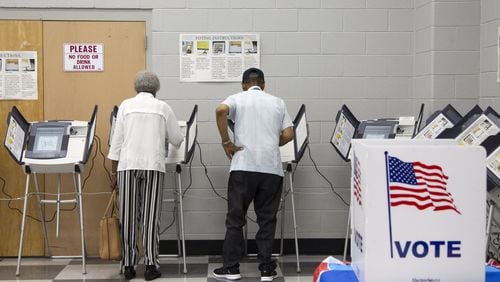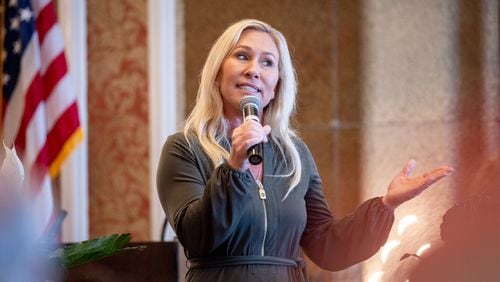Fifty-three-thousand Georgia voters have been placed on “pending” status because data on their voter-registration forms do not match exactly with data in other government databases. However, Secretary of State Brian Kemp — now the GOP nominee for governor — is correct when he reassures those 53,000 Georgians that they can vote a standard ballot in this year’s election.
But let’s be clear: If Kemp had his way, this story would have had a very different outcome. Those 53,000 can vote this year only because of a federal lawsuit filed in 2016 that accused Kemp and the state of Georgia of trying to “unlawfully disenfranchise tens of thousands of Georgia voting-eligible citizens, the vast majority of whom are minorities.”
The legal and factual arguments in that 2016 case against Kemp’s policy were so strong, and its unfair impact on minority voters so clear, that he surrendered without much of a fight. Put it another way, he got caught and he knew it.
Kemp agreed to a temporary order suspending that policy for the 2016 election. After the election, he agreed to a permanent settlement for those caught up in his nonsensical policy. It is those court-enforced restrictions, not Kemp’s good intentions, that today ensure those 53,000 can vote.
Under Kemp’s original policy, those 53,000 registrations with some sort of minor discrepancy would have been canceled outright after 40 days, with those voters losing their right to participate. If the Social Security Administration had you listed as Bae Ji-Hyun but your voter registration was entered as Bae Ji Hyun, you could not vote. If someone in the county election office mistyped your address as 4114 Main St. instead of 4141 Main St., through no fault of your own you could not vote.
That policy never served a valid public-policy purpose. It was also useless against voter fraud, in large part because for all practical purposes voter fraud doesn’t exist. Nationwide, tens of millions of votes are cast each election year, and each year the number of valid voting fraud cases that emerge from all those ballots can literally be counted on one hand.
In fact, for almost two decades now, conservatives at the local, state and federal levels have committed considerable government resources to try to prove that voter fraud is real, and every such effort has failed.
For example, the George W. Bush administration made federal prosecution of voter fraud cases a top priority, yet came up all but empty. The “Presidential Advisory Commission on Election Integrity,” formed by President Trump in early 2017, was an even greater disaster. Led by Vice President Mike Pence and Kansas Secretary of State Kris Kobach, that commission was supposed to provide the evidence needed to bolster Trump’s claims that as many as 5 million illegal immigrants had voted against him, thus explaining why he lost the popular vote. Instead, the commission collapsed under its own embarrassment and incompetence, with Trump forced to abolish it seven months after its creation in order to stop the humiliating headlines.
Given that extensive and well-documented history, it’s ridiculous to keep claiming that voter fraud occurs on a scale large enough to tilt elections, yet is somehow undetectable by law enforcement. But people keep claiming it and believing it because by doing so, they can keep trying to justify efforts to put more and more hurdles in the way of potential voters and by doing so alter the outcome of elections.
That is the true voter fraud.
About the Author






